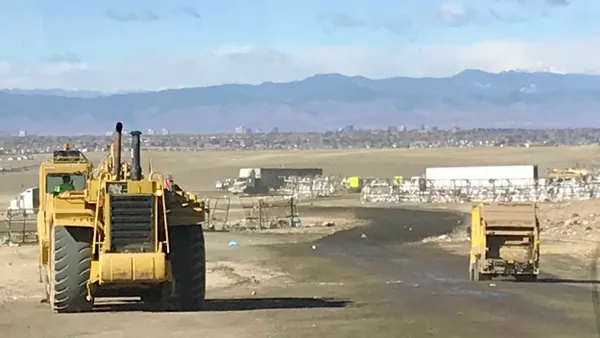Dive Brief:
- The New Hampshire branch of the Conservation Law Fund (CLF) says the state has the necessary authority to order the Coakley Landfill Group (CLG) to clean up PFAS chemicals from the Coakley Landfill in North Hampton, NH, according to Seacoast Online.
- The CLG appeared before a state commission on Monday, reiterating to officials that there is no proven link between contamination at the site and a "cluster of rare cancers" in the area, as reported by WMUR9.
- Portsmouth City Attorney Robert Sullivan said he is prepared to release "approximately 130" cardboard boxes-worth of documents and records related to the landfill, as reported by Seacoast Online. The documents, some of which are reportedly damaged from water and rust, were requested by Portsmouth's assistant mayor and a handful of state legislators.
Dive Insight:
The Coakley Landfill, a Superfund site, has been a contentious matter in New Hampshire for years. Lately, it's gained attention from local lawmakers because of inconsistent recordkeeping and because the CLG never installed a pump that the original Environmental Protection Agency (EPA) Record of Decision ordered. If that pump is not installed, the CLG (which is funded in part through local taxes) could owe the EPA $5 million in paybacks.
Currently, a bill (HB1766) to force cleanup of the site sits in committee in the New Hampshire Senate, with a hearing scheduled for April 3. The bill passed in the New Hampshire House by a wide margin. EPA Administrator Scott Pruitt has called the site a priority, and said he would work to expedite testing — though he has not commented on expediting cleanup, and the Coakley site is not on Pruitt's list of Superfund sites that are "targeted" for intense action by the administrator.
Now, Coakley stands at a confluence of local and federal action. It's state lawmakers that are trying to determine if the site is responsible for that cluster of cancer cases; it's federal officials who are overseeing the Superfund remediation; and it's local lawmakers who are calling for the release of records related to the site in order to paint a clearer picture of what's happened.
The CLF putting forward the opinion that the state can order cleanup, instead of waiting for federal action, could gain some traction. This is especially true since half of the New Hampshire legislature has already approved a bill that would order cleanup.
These forces could cooperate, or they could continue to muddy the waters over priorities and ultimate responsibility. While it is too soon to know for sure the fate of the Coakley site, the committee hearing on HB1766 could prove a deciding factor in whether New Hampshire will step in and move cleanup forward before the federal government acts.









